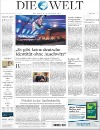
Germany and the world commemorated the 70th anniversary of the liberation of Auschwitz-Birkenau on 27 January, remembering the concentration camp in which “more than one million men, women and children, mostly Jews, were murdered […] from all over Europe” by the Nazi regime, writes Die Welt.
Even if German president Joachim Gauck did not name the anti-islam movement Pegida, the conservative daily reports that he launched an appeal to “protect solidarity and the rights of every fellow human being”. But Gauck also had a message for Europe and the world, the daily reports —
Citing the dramatic situation in Syria and in parts of Irak, Gauck repeated what he first openly said at the security conference in Munich: the demand that Germany should be more determined in supporting solutions in international conflicts – if necessary also by military means.
Receive the best of the independent European journalism straight to your inbox every Thursday
Gauck, Die Welt finally notes, acknowledged the Soviet liberation of Auschwitz, paraphrasing the president in saying that “the political and diplomatic hurdles that made a visit from Russia and Vladimir Putin impossible, should not hinder the acknowledgment of the Russian people.”
Do you like our work?
Help multilingual European journalism to thrive, without ads or paywalls. Your one-off or regular support will keep our newsroom independent. Thank you!















